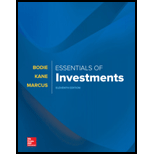
To think critically about:
In what circumstances, one would prefer to choose a
Introduction:
The dividend discount model(DDM)- It is a method where the stock prices of the companies are valued based on the methodology that the stock has a worth to provide the future dividends and is discounted back to their
Free cash flow(FCF) is a measure that states the amount of cash that a business generates after accounting for all the expenditures are capital in nature for example: Equipments, buildings etc.
Answer to Problem 1PS
The answer is one would choose to use a dividend discount model to value a mature firm that pays a relatively stable dividend.
Explanation of Solution
In case of Free Cash Flow model, the firm is valued based on the cash flow available to it or its equity holders net of capital expenditures. Hence this approach is very useful for the firms that pay no dividends. However, for the firms that pay no dividends, Dividend discount model is difficult to implement as the basic assumption is the value of stock depends on dividend
Want to see more full solutions like this?
Chapter 13 Solutions
Essentials Of Investments
- please don't use ai and if you cant understand given values please don't answer question otherwise unhelpful will be given.arrow_forwardfinance subjectarrow_forwardCould you help explain, what is the complete salary survey analysis, and ensuring the data is relevant and up-to-date? What is the job evaluation and compensation plan? How to ensure the final report is comprehensive, clearly structured, and aligned with the company vision?arrow_forward
- The maturity value of an $35,000 non-interest-bearing, simple discount 4%, 120-day note is:arrow_forwardCarl Sonntag wanted to compare what proceeds he would receive with a simple interest note versus a simple discount note. Both had the same terms: $18,905 at 10% for 4 years. Use ordinary interest as needed. Calculate the simple interest note proceeds. Calculate the simple discount note proceeds.arrow_forwardWhat you're solving for Solving for maturity value, discount period, bank discount, and proceeds of a note. What's given in the problem Face value: $55300 Rate of interest: 10% Length of note: 95 days Date of note: August 23rd Date note discounted: September 18th Bank discount rate:9 percentarrow_forward
 Essentials Of InvestmentsFinanceISBN:9781260013924Author:Bodie, Zvi, Kane, Alex, MARCUS, Alan J.Publisher:Mcgraw-hill Education,
Essentials Of InvestmentsFinanceISBN:9781260013924Author:Bodie, Zvi, Kane, Alex, MARCUS, Alan J.Publisher:Mcgraw-hill Education,

 Foundations Of FinanceFinanceISBN:9780134897264Author:KEOWN, Arthur J., Martin, John D., PETTY, J. WilliamPublisher:Pearson,
Foundations Of FinanceFinanceISBN:9780134897264Author:KEOWN, Arthur J., Martin, John D., PETTY, J. WilliamPublisher:Pearson, Fundamentals of Financial Management (MindTap Cou...FinanceISBN:9781337395250Author:Eugene F. Brigham, Joel F. HoustonPublisher:Cengage Learning
Fundamentals of Financial Management (MindTap Cou...FinanceISBN:9781337395250Author:Eugene F. Brigham, Joel F. HoustonPublisher:Cengage Learning Corporate Finance (The Mcgraw-hill/Irwin Series i...FinanceISBN:9780077861759Author:Stephen A. Ross Franco Modigliani Professor of Financial Economics Professor, Randolph W Westerfield Robert R. Dockson Deans Chair in Bus. Admin., Jeffrey Jaffe, Bradford D Jordan ProfessorPublisher:McGraw-Hill Education
Corporate Finance (The Mcgraw-hill/Irwin Series i...FinanceISBN:9780077861759Author:Stephen A. Ross Franco Modigliani Professor of Financial Economics Professor, Randolph W Westerfield Robert R. Dockson Deans Chair in Bus. Admin., Jeffrey Jaffe, Bradford D Jordan ProfessorPublisher:McGraw-Hill Education





